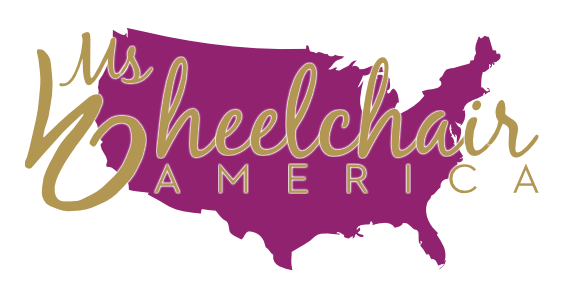Ms. Wheelchair America 2024 is Chandra Smith!
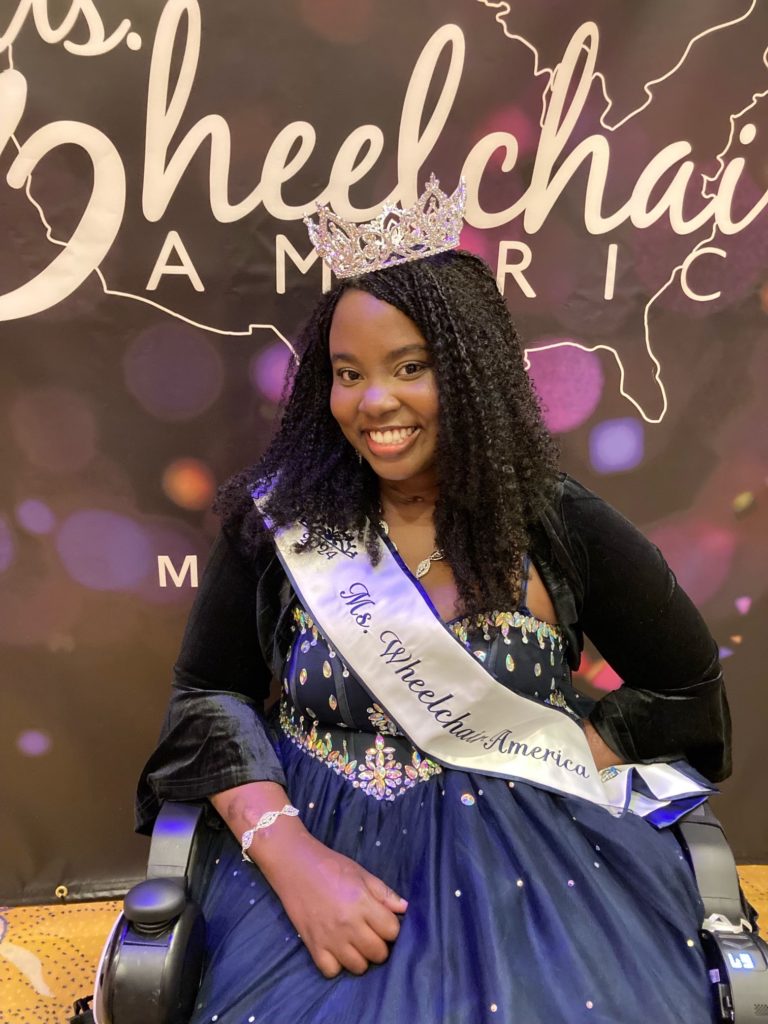
Chandra Smith is an IT engineer currently serving the 508 IT accessibility team for the Defense Intelligence Agency (DIA).
She is a woman of faith, a poet by night, and a dreamer. With a passion for both elegant code and the power of words, Chandra finds beauty in the complexities of algorithms, just as she does in the cadence of a well-written verse.
Born to two disabled parents, Chandra was introduced to challenges and hardships at a tender age. Her father suffered four strokes by the time she was a teenager. Her mother passed away last year from Sarcoidosis, a debilitating lung disease.
Her mother’s battle with Sarcoidosis shaped her resilience and became her greatest inspiration.
Growing up in a low-income family, Chandra understood that education was her family’s ticket out of poverty. She embraced this belief wholeheartedly, becoming a first-generation college graduate with not just one but three master’s degrees.
With over a decade of experience in the intelligence field, Chandra’s career has been nothing short of remarkable. Starting at the Central Intelligence Agency (CIA), she worked as a Deloitte contractor before finding her place at the Defense Intelligence Agency (DIA).
Her journey at DIA started as just an IT engineer, but she soon found herself supporting the 508 office, a role she initially knew nothing about.
Determined to make a difference, Chandra immersed herself in the world of accessibility. She followed people with disabilities and engaged with disability communities to expand her knowledge. Whenever possible, she championed the cause of accessibility, juggling multiple roles, including serving as the Vice President of DIA’s chapter of BIG (Blacks in Government) and organizing the first-ever IT accessibility symposium at DIA.
However, life took an unexpected turn in the fall of 2021. Chandra’s health deteriorated, leading to a hospitalization that would change her life forever. Faced with multi-organ failure, she was put on life-support, and the medication that saved her caused sepsis, resulting in three life-saving amputations. In a coma for three weeks, she also suffered a stroke that affected the mobility of her right hand, her only intact limb.
But Chandra’s fighting spirit prevailed. Emerging from the hospital after a year and a day, including six months in a burn unit due to medical burns covering 25% of her body, she defied the odds and embraced a world that had drastically changed.
Every staircase became a hurdle, every email a creative challenge, and every familiar place a new adventure. Yet, armed with her indomitable spirit, Chandra faced it all head-on and
returned to work.
Her resilience and determination did not go unnoticed. A year after being released from the hospital, she was crowned Ms. Wheelchair American 2024, triumphing in a week-long disability advocacy competition. With this new title, Chandra’s mission became clear: to spread awareness, promote advocacy, and change the world!
As a disability advocate, Chandra firmly believes that when we make things accessible for those with disabilities, the entire community benefits. She is committed to making digital content accessible to all, regardless of abilities.
Her vision for the future is inclusivity and equality, where individuals with disabilities have the same opportunities and experiences as everyone else.
Chandra’s story is not one of tragedy but of triumph and faith. She has overcome countless obstacles and continues to fight for a more inclusive society.
2023 is Ali Ingersoll of North Carolina
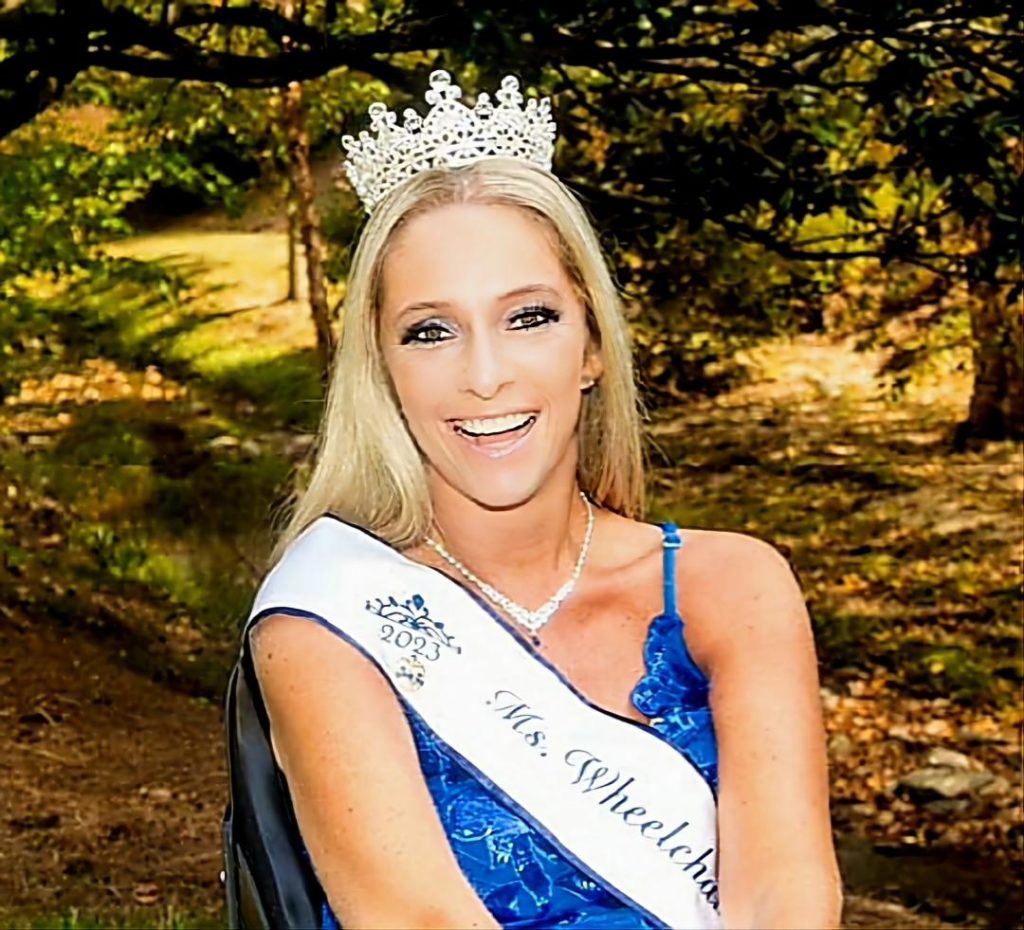
Ali Ingersoll spent her year focusing on health insurance advocacy. She continues to work with many organizations, legislators, advocates, and community members to fight for change in the systemic broken system within our health insurance company. During her reign she traveled from her home state of North Carolina to Florida, New York, and Washington DC. She believes it’s important to band together as one in order to affect the greatest change on the national stage and in local communities. Ali sustained a spinal cord injury from a shallow diving accident
2022 Christine Burke of California
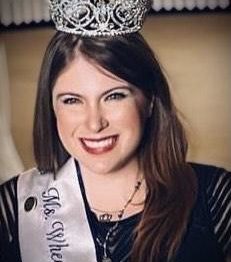
Christine Burke’s platform of “Putting Disability Back in Diversity” provided many opportunities to share this message, virtually and in-person. Her reign brought her from her home state of California to Nevada, New York, Michigan, Hawaii, and others. Christine was born with Spina Bifida and began advocating at a very young age. She will continue to speak and raise awareness, so people with disabilities are seen and heard.
2020 Hilary Muehlberger of Missouri
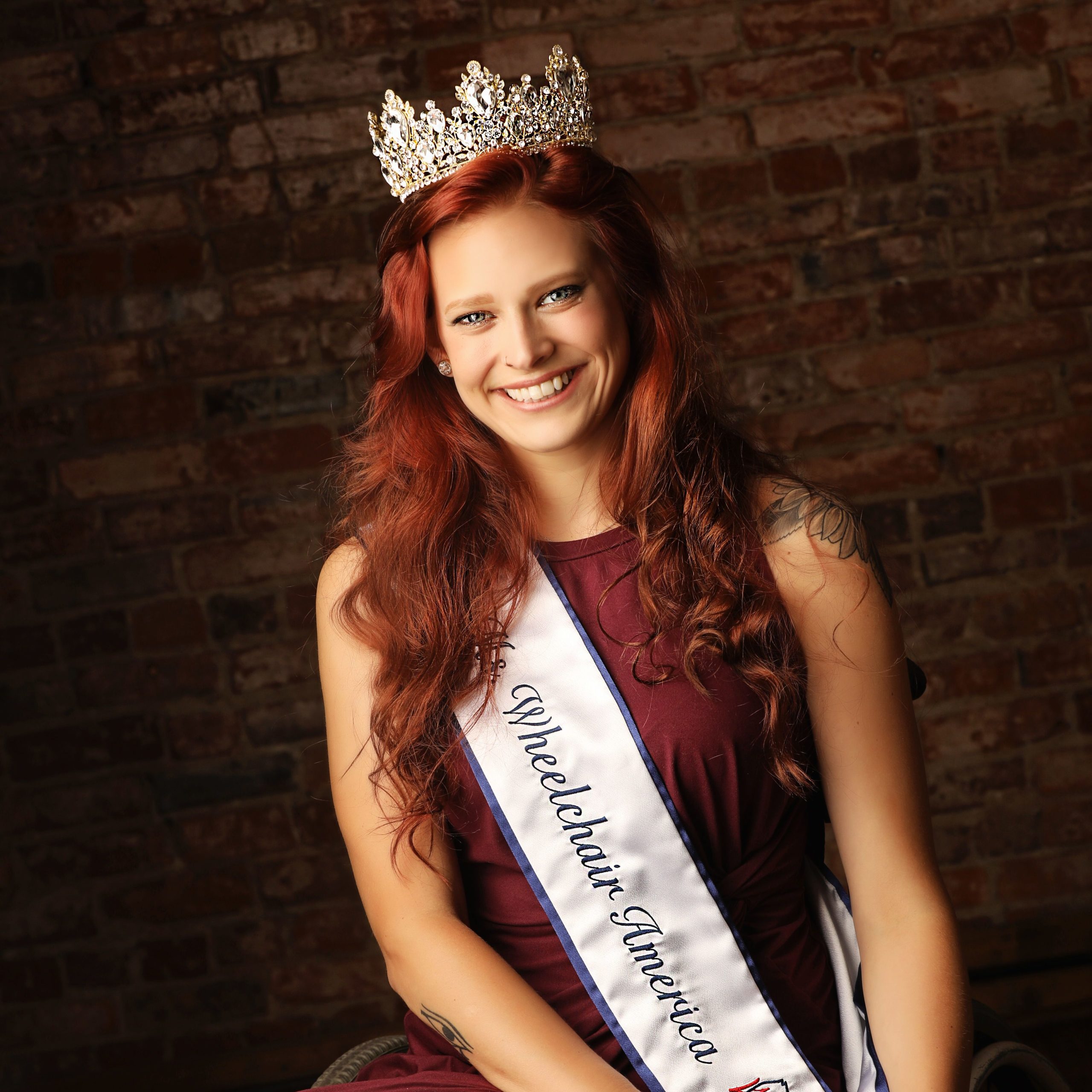
Hilary Muehlberger was eager to use her platform “Achieving Independence through Adaptive Sports”. She focused on educating individuals living with disabilities about the benefits of adaptive sports and their positive impact on live. It was through sports she discovered she could live life to the fullest and shine. Hilary uses a wheelchair for mobility because she has a spinal cord injury from an automobile accident is 2015. However, she has not let those circumstances stop her. Through advocacy and education, she set an example of true sportsmanship.
2019 Karen Roy of Louisiana
Karen’s platform, “Stand for Life”, was created by her years ago when she
realized that the use of technology that has existed for well over 30 years is terribly underutilized by people with disabilities. Karen spent her reign traveling the country speaking to people in the disabled community, medical professionals, lawmakers and insurance companies about the medical and psychological benefits of standing devices, functional electrical stimulation
and any technology created to keep people healthy and active.
https://www.facebook.com/LifePossibleKR/
2018 – Sheri Melander-Smith of Minnesota
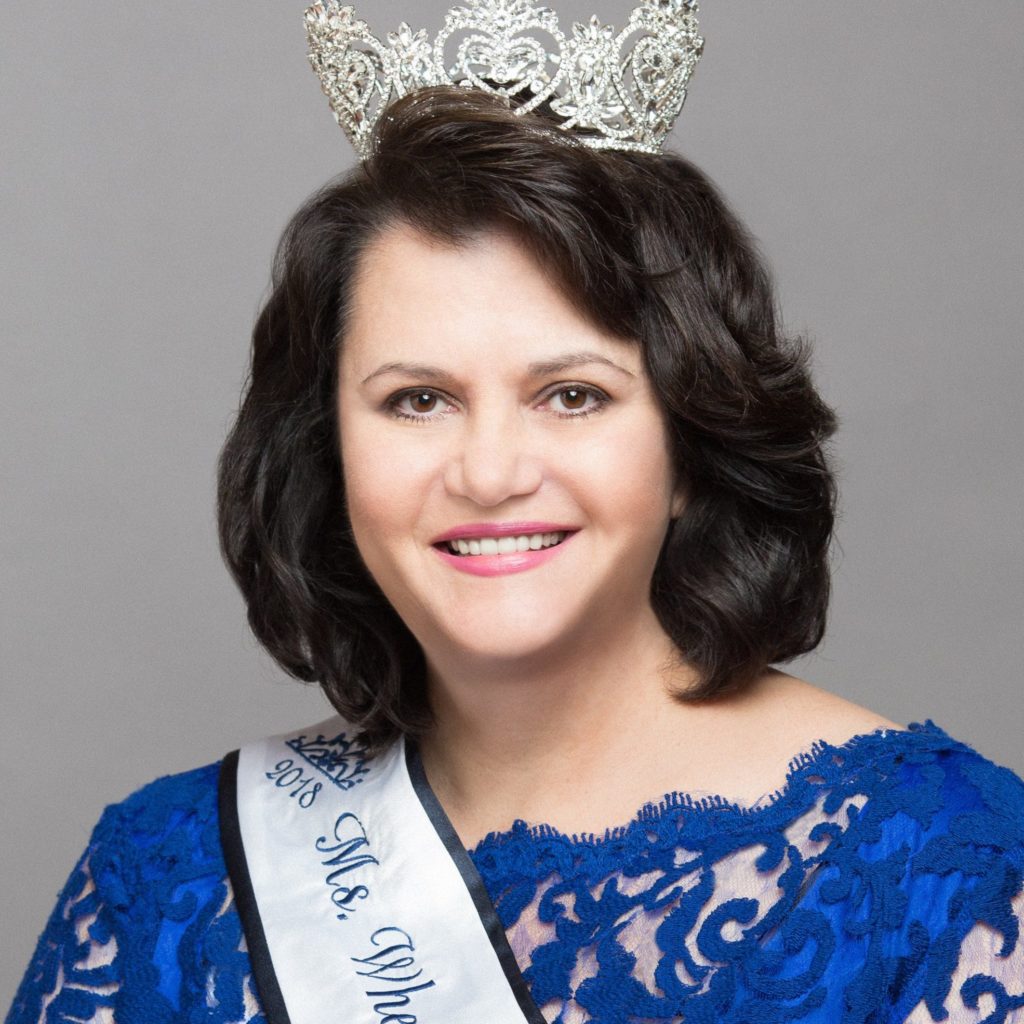
Sheri Melander-Smith of Chanhassen, Minnesota served the community and as a mentor for people living with a disability. She used her platform: “Living Forward” to guide her advocacy. She lives life to the fullest and aims to shine a positive light on disabilities. Through advocacy and education, she sets an example for other individuals who also use wheelchairs for mobility.
2017 – Eliza McIntosh-Stauffer of Utah
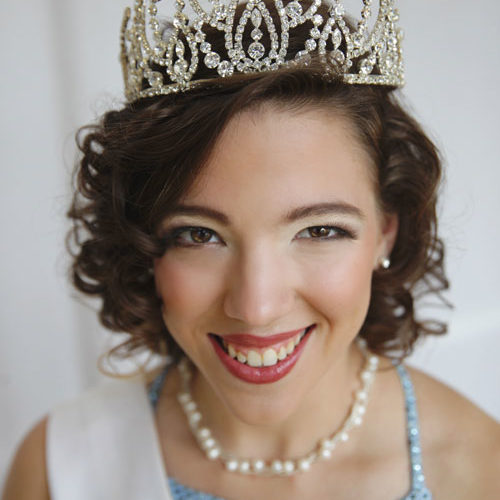
Eliza’s reign took her to 21 states and two countries. Through her travels, she was able to spread her platform: Where there is a wheel, there is a way – identify your passion, invite people to join you, and ignite your community behind you. Her passion for advocacy, education, and policy allowed her to encourage others to share their stories and use their strengths to impact the community.
2016 – Dr. Alette Coble-Temple of California
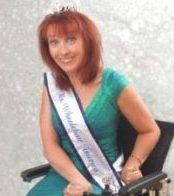
Alette spent her year as Ms. Wheelchair America traveling to 41 states and 3 countries, promoting her PRIDE (Parental Rights Include Disability Equality) platform. Her goals for her reign were to promote public acceptance and advance policy to help men and women with disabilities realize their dreams of having a family. Alette continues to balance her advocacy work with her 2 full time jobs as a professor at JFK University and the mother of a teenage daughter.
2015 – Samantha Schroth of Wisconsin
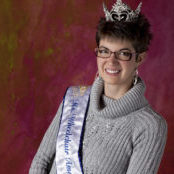
Samantha spent her year as Ms. Wheelchair America encouraging others to start conversations about disABILITIES and sharing her platform of “Learn. Teach. Repeat.” Sam believes that when one door closes, another opens and believes this is especially true in her life. She was on the fast track to becoming a veterinarian until her injury forced her to switch paths. Sam is currently in medical school with the hope of becoming a doctor specializing in spinal cord injury.
You can read more about Samantha on her blog
Photo courtesy of Theresa Thomas/Seize the Moment Photographic Artistry
2014 – Jennifer Adams of Washington
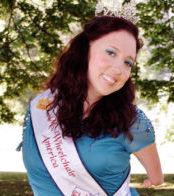
Jennifer believes that our limitations are not burdens, but gifts that help us realize our purpose and potential. Jenny spent her year as Ms. Wheelchair America traveling the country promoting this message with her “Inclusion Revolution” platform. Her messages also focused on her anti-bullying campaign and the effects that words, both positive and negative, can have on people.
2013 – Mariah Kilbourne of Texas
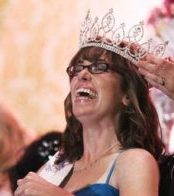
Mariah spent her year promoting inclusion in all aspects of life, from work to play, with her “Inclined for Inclusion” platform. She worked hard to promote fair and equal access to all buildings, especially those in historic districts, because she believes these barriers have plagued the disability community for too long.
2012 – Josie Badger of Pennsylvania

Josie spent her year traveling the country, including Alaska, promoting her platform of developing empowerment and leadership development of youth with disabilities. She also spent her reign promoting awareness of the need to eliminate architectural and attitudinal barriers, informing the able-bodied public of the achievements of the millions of people with disabilities across the nation.
2011 – Alexandra McArthur of North Carolina
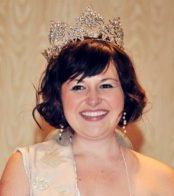
Alexandra spent her year advocating, inspiring and challenging every audience she spoke to. She also shared her platform of the importance of employment for people with disabilities to promote inclusion, which she believes happens person by person, and worked towards full and equal access for people with disabilities, changing one mind at a time throughout the year.
2010 – Erika Bogan of North Carolina
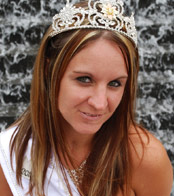
Erika used her own personal story as an example than anything is possible through perseverance and determination. Her platform also focused on seeing the abilities of all people with physical limitations and the need for state resources to promote independent living.
2009 – Michelle Colvard of Texas
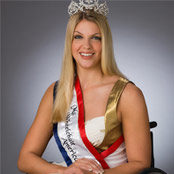
Michelle’s platform emphasized the need for people of all abilities to take responsibility for their own health and wellness. Her year as Ms. Wheelchair America helped prove that women who happen to use wheelchairs can be every bit as successful, vibrant and powerful as other women.
2008 – Kristen McCosh of Massachusetts
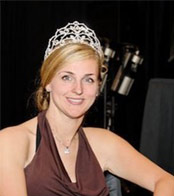
Kristen spent her year traveling across the country spreading the word about the accomplishments and achievements of people who use wheelchairs. She also spent her year advocating for vital programs and services that facilitate empowerment and success for people with disabilities, such as employment, success, education, transportation, housing and health care.
2007 – Autumn Grant of Massachusetts
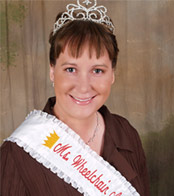
Autumn’s involvement with Ms. Wheelchair America began when she was crowned Ms. Wheelchair Massachusetts in 2006. She has served in several positions on the Board of Directors and currently works as the Associate Director or Undergraduate and Student Affairs at Northeastern University.
2006 – Kristen Connors of Rhode Island
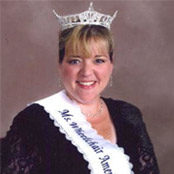
Kristen combined her employment and leadership knowledge and her advocacy work to pursue her platform of “Breaking Down Attitudinal Barriers for People with Disabilities in the Workforce.” People with disabilities face obstacles in the workforce every day and Kristen believes that we are the only ones who can set limits for our potential to overcome these obstacles.
2005 – Juliette Rizzo of Maryland
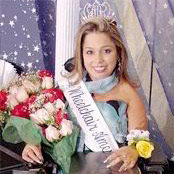
Juliette empowered Americans with disabilities though her Ms. Wheelchair platform, “Power through Participation: Illuminating Opportunities for People with Disabilities.” She believed that community participation is more than having a physical presence but is also about finding your identity through your involvement in personal contribution to community life.
2004 – Cinda Hughes of Oklahoma
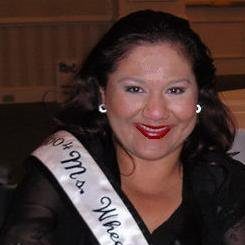
During her reign, Cinda encouraged other young women with disabilities to use the gifts they have been given and not to focus on their physical limitations. Cinda believed that Ms. Wheelchair America “has the responsibility and opportunity to reinforce inner beauty and the spiritual gifts that women with disabilities possess – grace, tenacity, perseverance and empathy.”
2003 – Catherine Gugala of Wisconsin
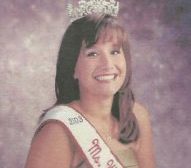
A positive attitude helped Catherine Gugala as she spread her platform to youth with disabilities. She encouraged them not to hold themselves back, but to focus on their abilities, not their disabilities. She believed there was a need to help them see they could contribute to society, if they would focus on their strengths and not dwell on what their weaknesses.
2002 – Candy Marsh of Colorado

With poise and demeanor, Candy helped bring attention that America still had a long way to go to appreciate the potential and the challenges that people with disabilities need to overcome. Unfairly misjudged, because of their disabilities, Candy shared her message with advocacy and education to change the public perception of the disabled.
2001 – Nicki Ard of South Carolina
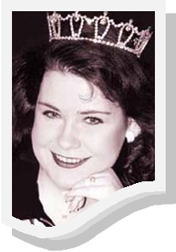
Nicki Ard, Ms. Wheelchair America 2001, embodied the true spirit and mission of the organization. Nicki’s purpose in the short life she was blessed with was serving and advocating for people with disabilities. She did this through her motivational speaking and her music ministry. Nicki passed away one month before her reign ended. MWA continues to honor her memory and service and service with the Nicki Ard Award, which is given to the contestant who best embodies Nicki’s spirit and passion for advocacy.
2000 – Tracy Charlton-O’Connor of South Dakota
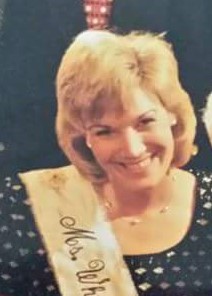
Ms. Wheelchair America 2000, Tracy Charlton shared her platform “Use your mind to protect your body” to help educate youth. The dangers of risky behavior that can lead to both head and spinal cord injuries. These and other injuries could be prevented if youth would “Think first”. Her wheelchair made her life easier and she wanted other people with disabilities to also have a better quality of life.
1999 – Christina Gilmore of Wisconsin
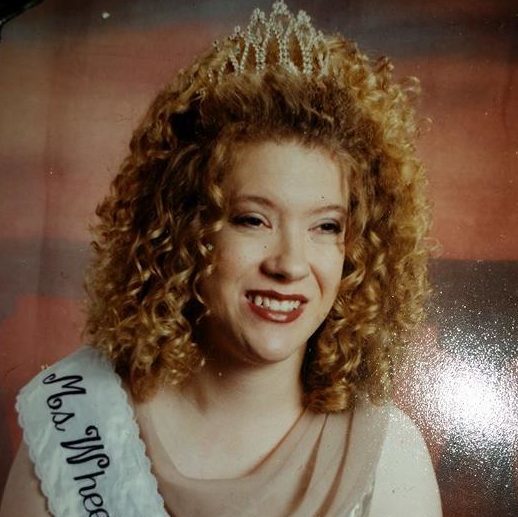
Christina believed giving back to society made a difference in advocacy. She did this through volunteering for many organizations in her community. As an active volunteer, she encouraged others to volunteer also. She knew through sharing ones accomplishments and experiences they would be an example of effort and hard work, which would help others see true ability.
1998 – Terri Cecil of Kentucky

Sports were a driving force for Terri. She often used them to dispel the stereotypes that people with disabilities faced. She used sports, both wheelchair basketball and wheelchair fencing, as an example of hard work and success. Her wheelchair simply helped get her from Point A to Point B, it was transportation. When speaking she shared that Success isn’t about making money, it is about making a difference and touching lives.
1997 – Elaine Stefanowicz of Washington
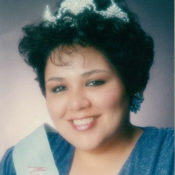
Elaine Stefanowicz was Ms. Wheelchair America 1997. Winning the title was a life-changing experience that helped Elaine win a full-ride scholarship and the 2003 Woman of Distinction Award from the Girl Scouts. Elaine is now serving on the Governor’s Committee on Disability Issues & Employment. She also works as an Educational Planner at Green River Community College in Auburn, WA, where she advises for all of the health science programs. Elaine is still friends with many of the women who were in the pageant with her and will always cherish her time as Ms. Wheelchair America.
1996 – Amy Baxter-Ley of Texas

Amy (Baxter) Ley of Texas was Ms. Wheelchair America 1996. Amy worked to educate as many people as possible about the MWA Program. Amy worked for American Airlines during her year and traveled extensively. Amy served on the Board of Directors and was also a State and National Judge for many years. Amy served for 11 years on the Texas Council for Developmental Disabilities and is currently kept busy by her job and family. Any free time is spent staying in shape (and strong) with Camp Gladiator and a personal trainer, church, traveling and cooking.
1995 – Wendy Petzold of Wisconsin
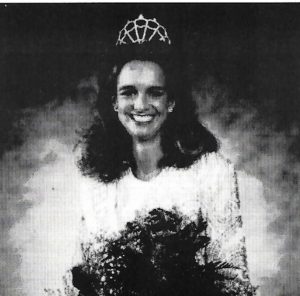
Wendy spoke to many schools, groups and government leaders. She urged people to keep trying despite challenges. Being confined to wheelchairs, didn’t mean anyone was confined for life. She used this attitude to dispel the negative stereotypes held by employers about the abilities of people with disabilities. Her travels as Ms. Wheelchair America also allowed her to improve the behavior of airline personnel toward their passengers with disabilities, because she often felt they treated her as a nuisance because of her need extra time.
1994 – Dawn Blodgett of California
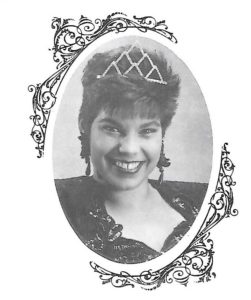
Dawn was an outgoing advocate for people for the rights of disabled people. She was never afraid to speak her mind. Dawn shared the frustrations of people with disabilities to highlight that the general public needed to be educated so they would understand the struggles others faced. She used her title to share the message things will not be easy, people will stare, but could you put a smile on your face and continue to reach your goals.
1993 – Kim Mensi of Alabama
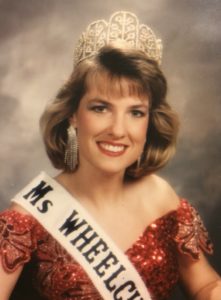
Kim was active in advocacy from an early age when her school did not provide the accessibility she needed. She used her personal experience to spread the message of the Americans with Disabilities Act that required businesses, schools and public spaces to give her assess. Her personal life served as an example to children that her disability did not stop her from achieving many things with hope that barriers for young children with disabilities would be broken and give others more opportunities.
1992 – Deanna Greene-VanHook of Texas
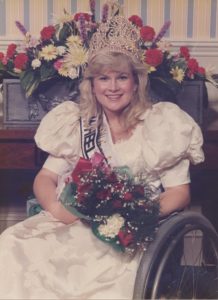
Deanna spread a message that in our society people were labeled. These labels only divided us. She shared this platform and worked to eliminate negative labels which caused discrimination and denied access for people with disabilities. She also brought needed attention that celebrated women that had achieved remarkable achievements, but went unnoticed. She loved talking with children with disabilities, to help them find the confidence she needed while she was young.
1991 – Mercedes Rodriguez-Fowler of Florida

Nine days after her 21st birthday, Mercedes sustained a spinal cord injury, the driver of the vehicle was speeding and lost control because they were intoxicated. She shared this life changing experience, which brought much needed awareness to the dangers and consequences of drinking and driving. The power of her message was recognized when she traveled to Washington DC to receive the National Victory Award, which recognized me individuals that have overcome adversity.
1990 – Kathy Garcia-Farnsworth of Utah
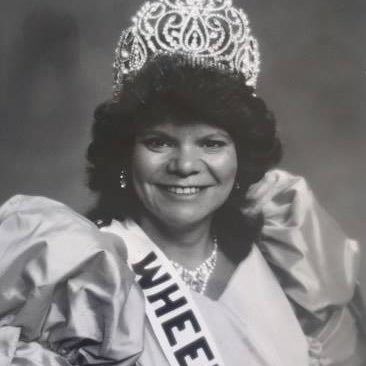
Kathy Garcia used her time asked Ms. Wheelchair America to combat the issues and to eradicate the stereotypes and labels that have been hung on those termed “disabled” she saw many attitudes that encouraged through employment, housing and transportation. She used her message to help lobby for the congressional passage of the American with Disabilities Act. On July 26, 1990 she was on the White House lawn to watch the signing by President George HW Bush.
1989 – Jewell Massey of Georgia
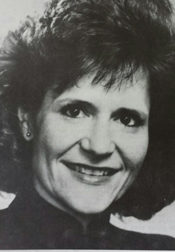
Jewell Massey was Ms. Wheelchair America 1989. Although platforms were not used at the time, Jewell’s focus during her reign was the importance of mainstreaming in social development. Her travel was not as extensive as that of some of today’s titleholders because she worked as a gifted education teacher. Jewell considers herself somewhat of a dark horse winner because she did not socialize a great deal outside of the planned events. Jewell is now retired from a long teaching career and is restoring a house in Knoxville, TN.
1988 – Peggy Simpson of Alabama
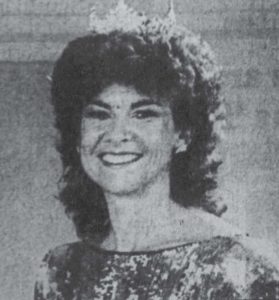
Peggy believed that problems need to be turned into opportunities and that easily identifiable barriers, such as narrow doorways and stairs, are not obstacles as big as fear and ignorance – the fear of many people with disabilities to ‘step out of their comfort zones’ and the ignorance of many able-bodied people to realize the differences they see don’t truly exist. Peggy believed that with communication and hard work, we can build a better tomorrow.
1987 – Sandra Honbaier of North Carolina
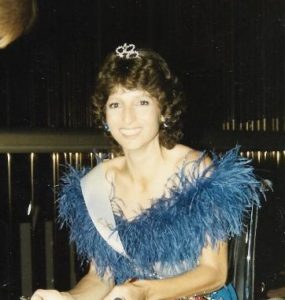
Sandra’s bubbly personality was a positive when traveling throughout the United States speaking on issues and challenges for the disabled. She emphasized the importance of the community working with people with disabilities in the community. Working together is needed to remove barriers to the disabled, while working together they can adapt the environment. Her message to people with disabilities was the importance of maintaining a independent spirit.
1986 – Donna Cline of Nevada
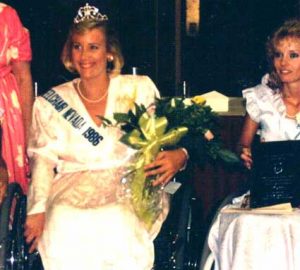
Professionally Donna worked as a television news anchor in Nevada. It was her change of attitude from assertive to aggressive that allowed her to reach her goals. This attitude impacted her reign so she could serve as a positive spokesperson, advocate and example while dispelling many myths. She focused on changing attitudinal barriers and helping other people with disabilities stretch to reach their goals.
1985 – Gaynell Colburn of Maryland
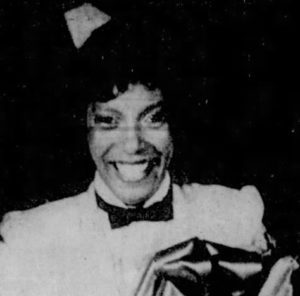
Ms. Wheelchair America 1985 and professional musician, Gaynell Colburn used her talents and voice to impact many. She championed accessibility for entertainment venues, she supported public transportation issues for people with disabilities, and worked to bring awareness for children with disabilities. She was honored for these efforts with a Baltimore’s Best Award from the Mayor.
1984 – Lori Cottam of Utah
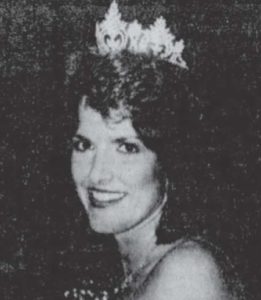
Lori embraced her year as Ms. Wheelchair America traveling over 30,000 miles. Her goal was to help teach that people with disabilities had many capabilities and could be good employees. She saw what others had done with their lives and realized the potential. Her one piece of advice was “Treat a person with a disability the same way you yourself would want to be treated.
1983 – Barbara Crozier of Alabama
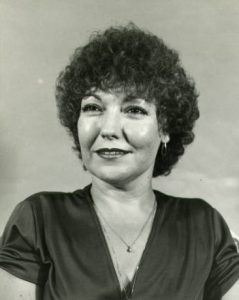
Barbara described herself as “feisty”. She used this to speak to new laws that were put in place to give people with disabilities the rights they deserved. She demanded that handicap parking laws be enforced. Another demand included making polling places and voting machines accessible. Bringing public understanding to the needs of handicapped was her driving force. After her reign she continued bringing attention and advocating when she saw the need.
1982 – Marian Schooling-Vessels of Maryland
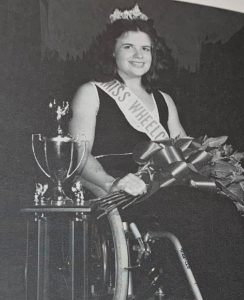
Marian spent her reign traveling the country attempting to dispel some of the myths and break down the attitudinal barriers that the general public held about people with disabilities. Marian has a Bachelor of Science in Community Health Education and was pursuing her Master’s degree in Public Health.
1981 – Vivienne Thomson of Massachusetts
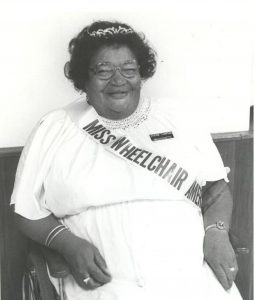
Vivienne began her advocacy journey as a way to show her children that she would not be a burden on them. Vivienne spent her reign breaking down attitudinal barriers that people with disabilities face, making an attempt to show people that a disability does not define your entire life. She believed that once these attitudinal barriers are broken down, the architectural barriers will soon follow.
1980 – Nancy Pudvin of Georgia
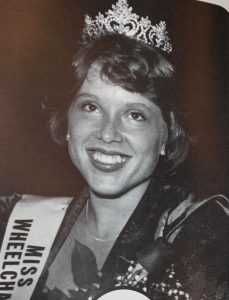
Nancy Pudvin not only won the crown but graduated from Georgia State University on the same day. Nancy focused her year dispelling the attitudinal barriers that held people with disabilities back. She knew once the attitudinal barriers were removed the architectural ones would follow. She brought attention to the need for curb cutouts and ramps needed to have access to restaurants and other business’s so people in wheelchairs could join society.
1979 – Margaret Chmielewski of Michigan
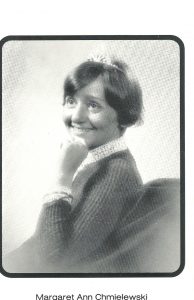
Marge spent her year traveling over 38,000 miles bringing attention to the education, employment, housing and transportation difficulties that people with disabilities faced. She lectured groups, testified before congressional committees and met with people with disabilities. She believed that self-acceptance and a strong sense of humor were needed to succeed. When she finished her reign, she returned to work at Madonna College as a Professor of Psychology and continued to use her voice for others.
1978 – Margie Sloan of Georgia
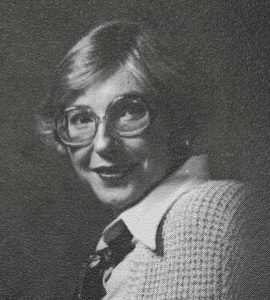
Margie spent her reign workings toward civil rights and equal employment for those with disabilities. Her philosophy was based on equal rights, equal justice and equal opportunity for all and she worked hard to promote that philosophy.
1977 – Beverly Chapman of Florida
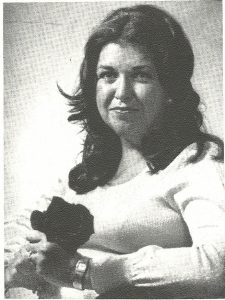
Beverly had a very busy reign, her travels gave her the opportunity to visit many states and meet President Gerald Ford in Washington DC. Her major focus was to bring attention to the architectural barriers that exist and how they prevented people with disabilities to contribute to society. She continued to her advocacy work after she relinquished her crown. Her regular column “Accessing Life” was featured in the Orlando Sentinel for many years.
1976 – Dixie Lee Etheridge of Mississippi
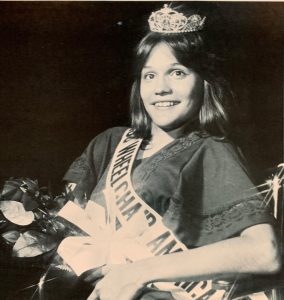
During her reign, Dixie traveled throughout the country promoting the goals and mission of the Ms. Wheelchair America organization and had the opportunity to discuss the problems of attitudinal and architectural barriers that face people with disabilities with President and Mrs. Gerald Ford. Dixie let her own accomplishments, a Bachelors’s degree in Education and the pursuance of a Master’s in Speech Pathology and Audiology, speak to the public that while those with disabilities may have physical limitations, they are not incapable.
1975 – Diana Kenderian of New Jersey
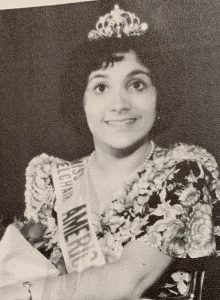
Diana, an outspoken advocate and spent her reign championing equal rights for people with disabilities. She was active in her community and in many organizations for people with disabilities and uses these platforms, as well as her reign, to spread her message that “there is nothing wrong, sad or different about being disabled. It is only when society makes people different that problems arise.”
1974 – Caryl Jane (Janie) Robinson of Texas
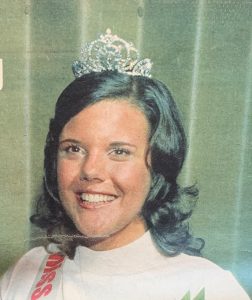
Janie was crowned in Columbus, Ohio after a weekend of interviews based on personality and accomplishments. Janie worked as a coordinator for Driver’s Evaluation and Training at Texas Institute of Rehabilitation and Research and was pursuing her degree in Psychology.
1973 – Patricia Nevin of Michigan
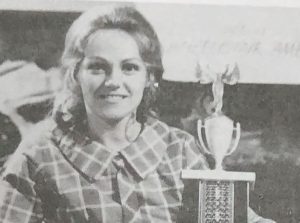
The first Ms. Wheelchair America, Pat was crowned after a weekend of interviews based on personality and accomplishments. Pat was active in wheelchair sports and was an officer with the Michigan Wheelchair Athletic Association. Pat wanted to be a Recreational Director for wheelchair sports.

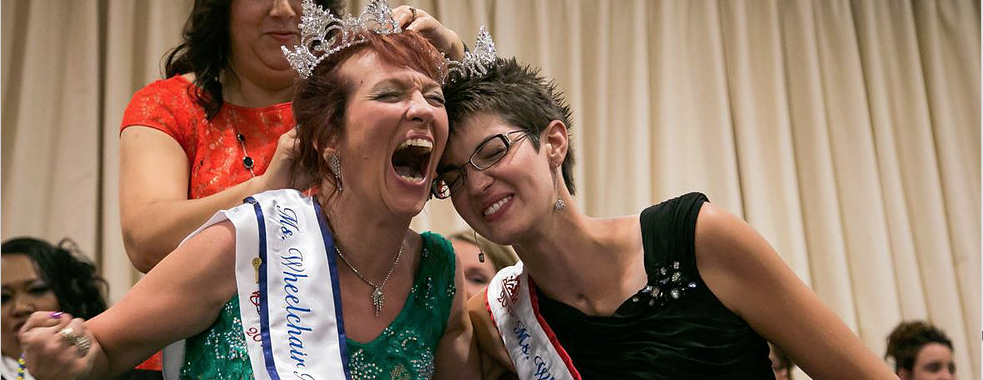
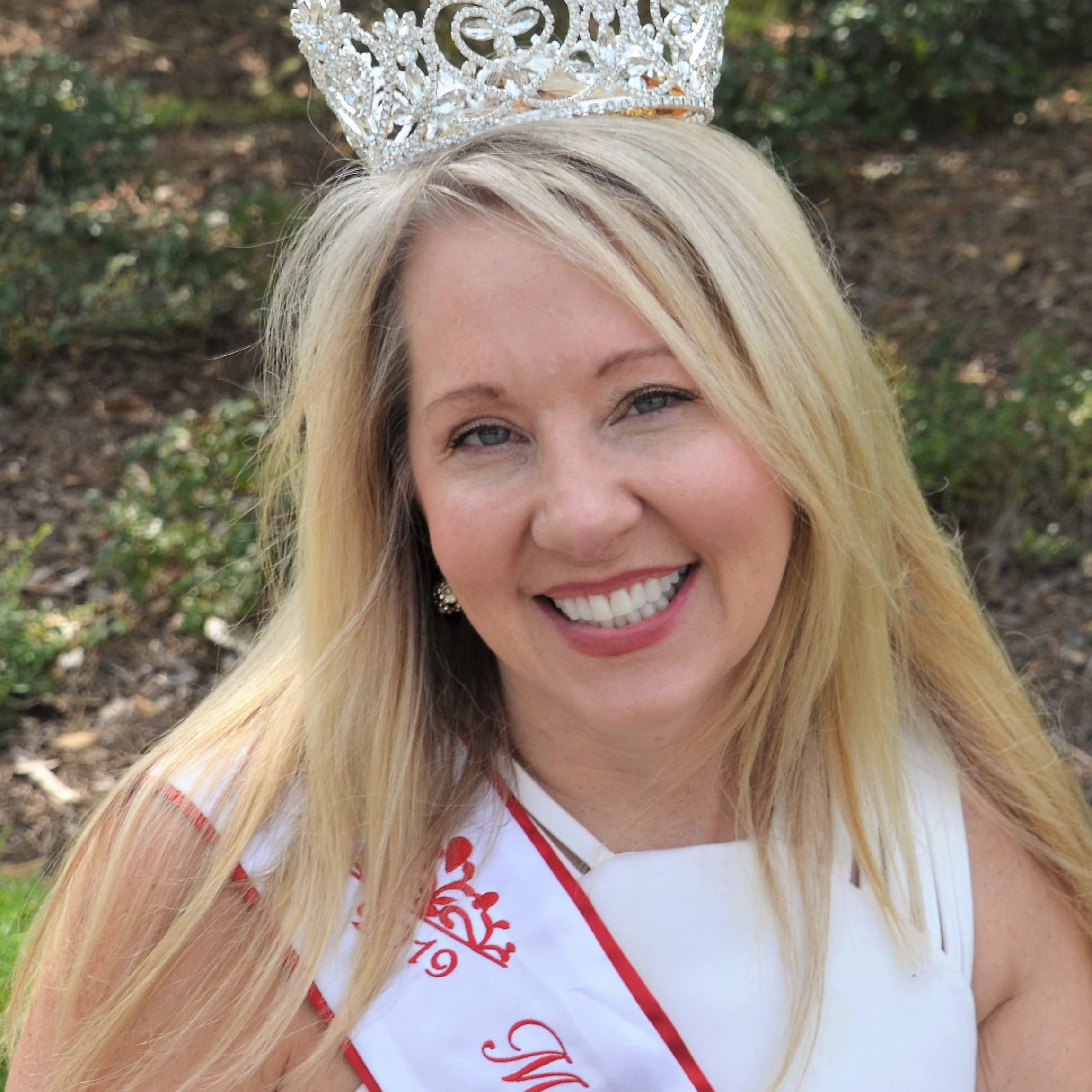




 Become a Sponsor
Become a Sponsor Donate
Donate


